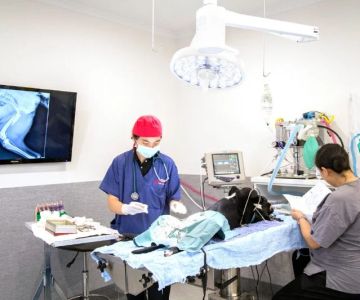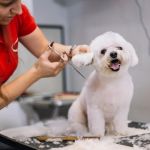
The Role of Probiotics in Pet Health: Should You Supplement?
- What Are Probiotics and How Do They Help Pets?
- The Benefits of Probiotics for Pet Health
- When Should You Supplement Your Pet’s Diet with Probiotics?
- How to Choose the Right Probiotic for Your Pet
- Real-Life Example: The Impact of Probiotics on Pet Health
- Considerations Before Supplementing Your Pet with Probiotics
1. What Are Probiotics and How Do They Help Pets?
Probiotics are live microorganisms, often referred to as "good bacteria," that provide health benefits when consumed in adequate amounts. Just like humans, pets have a complex gut microbiome that plays a crucial role in their overall health, especially digestive health. Probiotics help maintain a healthy balance of gut bacteria, which is essential for proper digestion, immune function, and even mental well-being.
When pets experience an imbalance in their gut flora, whether due to stress, illness, or antibiotics, probiotics can restore the natural balance, leading to improved digestion and better overall health. Probiotics for pets are available in various forms, including powders, capsules, and chews, making it easy for pet owners to incorporate them into their pets’ daily routines.
2. The Benefits of Probiotics for Pet Health
Probiotics offer a range of benefits that can significantly improve your pet's health. Here are some of the most notable advantages:
- Improved Digestive Health: Probiotics support a healthy digestive system by promoting the growth of beneficial bacteria, aiding in the breakdown of food and absorption of nutrients. This can help alleviate common digestive issues such as diarrhea, constipation, and bloating.
- Enhanced Immune Function: The gut plays a vital role in immune health. By balancing the gut microbiome, probiotics can help boost your pet’s immune system, making them less susceptible to infections and diseases.
- Reduced Allergies and Inflammation: Probiotics may help reduce the symptoms of allergies, particularly digestive-related allergies, by supporting the immune system and reducing inflammation in the digestive tract.
- Relief from Stress and Anxiety: Stress can disrupt your pet’s digestive system. By helping to maintain gut health, probiotics may also help reduce stress-related digestive issues, contributing to a more balanced and calm pet.
- Support for Healthy Skin and Coat: A healthy gut can lead to healthier skin and a shinier coat. Probiotics support the gut’s ability to absorb essential nutrients, contributing to overall skin health and reducing issues like dry skin or dandruff.
These benefits highlight the importance of maintaining a balanced gut microbiome for your pet’s well-being, which can be achieved through proper supplementation of probiotics.
3. When Should You Supplement Your Pet’s Diet with Probiotics?
Not all pets need probiotic supplements, but there are certain situations when probiotics can be particularly beneficial:
- After Antibiotic Treatment: Antibiotics can kill both harmful and beneficial bacteria in your pet’s digestive system, leading to an imbalance. Probiotics can help restore the healthy bacteria in their gut after antibiotic treatment.
- For Pets with Digestive Issues: If your pet is experiencing gastrointestinal issues such as diarrhea, constipation, or bloating, probiotics can help restore balance in their digestive system and alleviate these problems.
- During Stressful Situations: Pets that are stressed due to changes in their environment, travel, or new experiences may benefit from probiotics. Stress can negatively affect their digestive health, and probiotics can help ease these issues.
- For Senior Pets: As pets age, their digestive system may become less efficient. Probiotics can help maintain digestive health and improve nutrient absorption in older pets.
- For Pets with Skin or Coat Problems: If your pet has recurring skin issues like dryness or dandruff, probiotics may help by improving the absorption of essential nutrients and promoting overall skin health.
If you’re unsure whether your pet would benefit from probiotics, it’s always a good idea to consult with your veterinarian. They can provide personalized recommendations based on your pet's health history and current condition.
4. How to Choose the Right Probiotic for Your Pet
When selecting a probiotic for your pet, it’s important to choose a high-quality product that is specifically designed for animals. Here are some factors to consider when choosing the right probiotic for your pet:
- Species-Specific Strains: Look for probiotics that contain strains of bacteria that are beneficial for your pet’s species (e.g., dogs, cats, or small animals). These probiotics are formulated to work with your pet’s unique digestive system.
- CFU Count: CFU stands for “colony-forming units,” which indicates the number of live bacteria in a supplement. A higher CFU count doesn’t always mean a better product, but it’s important to choose one with an appropriate dose for your pet’s size and needs.
- Formulation: Probiotics for pets come in various forms, such as powders, capsules, and chews. Choose a form that is easy to administer based on your pet’s preferences and needs.
- Quality and Purity: Opt for probiotics from reputable brands that use high-quality ingredients and have undergone third-party testing for safety and efficacy.
Choosing the right probiotic will depend on your pet's specific needs and health conditions, so always check with your veterinarian before starting supplementation.
5. Real-Life Example: The Impact of Probiotics on Pet Health
Consider the case of Daisy, a 4-year-old Labrador who suffered from chronic digestive issues, including frequent bouts of diarrhea and bloating. Her owner, Sarah, tried various treatments but saw little improvement. After consulting with a vet, Sarah decided to add a high-quality probiotic to Daisy’s diet.
Within a few weeks of using the probiotic, Daisy’s digestive issues significantly improved. She stopped experiencing bloating, and her stool became more regular and firm. Sarah was thrilled with the results, and Daisy seemed more energetic and happier. This case highlights how probiotics can make a tangible difference in a pet’s digestive health and overall well-being.
6. Considerations Before Supplementing Your Pet with Probiotics
Before starting any supplementation, it’s important to consider a few things:
- Consult Your Veterinarian: Always consult your vet before introducing any new supplements to your pet’s diet, especially if your pet has underlying health conditions or is on medication.
- Watch for Side Effects: While probiotics are generally safe, some pets may experience mild side effects like gas or an upset stomach when starting a new supplement. Monitor your pet’s reaction and adjust the dosage as needed.
- Use as Part of a Balanced Diet: Probiotics should be used alongside a healthy, balanced diet. They are a supplement, not a substitute for proper nutrition.
By carefully selecting the right probiotics and consulting with your vet, you can provide your pet with the best possible care and support their digestive and overall health.









 Princeton Veterinary Hospital4.0 (821 reviews)
Princeton Veterinary Hospital4.0 (821 reviews) Thomas Ridge Kennels4.0 (17 reviews)
Thomas Ridge Kennels4.0 (17 reviews) All Creatures Animal Hospital4.0 (354 reviews)
All Creatures Animal Hospital4.0 (354 reviews) Fatty Paws Pet Boutique0.0 (0 reviews)
Fatty Paws Pet Boutique0.0 (0 reviews) CityVet | Lone Mountain Veterinary & Urgent Care4.0 (104 reviews)
CityVet | Lone Mountain Veterinary & Urgent Care4.0 (104 reviews) Petnificent Picks5.0 (1 reviews)
Petnificent Picks5.0 (1 reviews) How to Transition a Senior Pet to Easier-to-Eat Food: A Comprehensive Guide
How to Transition a Senior Pet to Easier-to-Eat Food: A Comprehensive Guide The Hidden Dangers in Common Pet Supplies: What You Need to Know
The Hidden Dangers in Common Pet Supplies: What You Need to Know Managing Chronic Conditions in Pets: Essential Diet, Medication & Lifestyle Tips
Managing Chronic Conditions in Pets: Essential Diet, Medication & Lifestyle Tips How to Build a Pet Emergency Kit: Essentials You Need
How to Build a Pet Emergency Kit: Essentials You Need Best Practices for Pet Grooming Frequency by Breed: Keeping Your Pet’s Coat Healthy
Best Practices for Pet Grooming Frequency by Breed: Keeping Your Pet’s Coat Healthy The Effect of Seasonal Allergies on Pets & How to Help
The Effect of Seasonal Allergies on Pets & How to Help